 Happy new year! Winter has finally decided to show its face around here in Oklahoma. With single digit temps (Fahrenheit), frost on the windows, and cozy blankets comes the perfect excuse to hibernate with a good book. So, grab your favorite mug filled with a hot drink, curl up in your reading nook, and let's embark on a short journey through the best books to read during winter, each accompanied by a fitting soundtrack. This is the part where I tell you that this post contains Amazon Affiliate links. So, when you click on one of the book names and purchase something through that link, not only will you be helping the seller/author, but I will get a small commission as well! 1. "The Bear and the Nightingale" by Katherine Arden Book: Immerse yourself in the enchanting world of Russian folklore as Vasilisa battles dark forces in a snowy wilderness. Song: "Winter Winds" by Mumford & Sons Why: Because nothing says winter like winds and mythical creatures. 2. "The Lion, the Witch and the Wardrobe" by C.S. Lewis Book: Whether you've read this once, or a thousand times, nothing beats the magic that C.S. Lewis penned. Join the Pevensie siblings in the magical land of Narnia as they confront the White Witch's icy reign. Song: "Mr. Tumnus" by Harry Gregson-Williams (from the movie soundtrack) Why: Because, let's face it, we all secretly want a faun friend (and this soundtrack *chefs kiss*) 3. "The Night Circus" by Erin Morgenstern Book: Step into the magical world of a mysterious circus that only appears at night. Prepare for enchanting wonders and a duel between two illusionists. Song: "Dream" by Priscilla Ahn Why: Because every good circus needs a dreamy soundtrack, and this one is no exception. 4. "Little Women" by Louisa May Alcott Book: Join the March sisters in this classic tale of love, sisterhood, and personal growth, set against the backdrop of New England winters. Song: "Winter Things" by Ariana Grande Why: Because even in the 19th century, they knew how to appreciate winter things. 5. "The Snow Child" by Eowyn Ivey Book: Set against the backdrop of an Alaskan winter, this novel weaves a poignant tale of a childless couple and a mysterious girl who appears in the snow. Song: "Winter Song" by Sara Bareilles and Ingrid Michaelson Why: Because sometimes a winter's tale needs a melancholic yet beautiful soundtrack. 6. "The Mark of the Lion" series by Francine Rivers Book: Immerse yourself in ancient Rome with this gripping trilogy, featuring characters like gladiators, strong-willed women, and a dash of political intrigue. It's like "Gladiator" but with a more divine plot twist. Song: "That's How You Change The World" by Newsboys Why: Because it's the small, everyday actions that can truly change lives and the world. And there you have it, a winter reading list that will transport you to realms of magic, adventure, and perhaps a cozy fireplace or two. Remember, the best books are those that not only warm your soul but also come with a soundtrack that turns the pages of your heart (IMHO). Happy reading, and may your winter (and 2024) be filled with the chills and wonder that only a good book and song can provide!
'Tis the season of magic, dragons, and epic adventures! If you have a fantasy book lover in your life (or if that's you), this gift guide is here to sprinkle a bit of enchantment into your holiday season. From cozy reading nooks to mystical bookish accessories, I've scoured Amazon for the perfect gifts that will transport any fantasy enthusiast to their favorite realms.
Speaking of Amazon, this post has Affiliate Links which means that, when you purchase one of the items using this link, not only does the seller of the item get paid, but I also get a small commission!
I hope this guide has sparked your imagination and provided a map to treasures fit for any fantasy enthusiast. Whether you're gifting to a seasoned wizard of words or a fledgling adventurer in the world of fantasy literature, the items on this list are crafted to add a touch of magic to their reading experience.
Remember, the best gifts are the ones that transport your loved ones to magical places. With these enchanting items, your fantasy book lover is sure to have a holiday season filled with wonder and literary delight. Happy gifting! 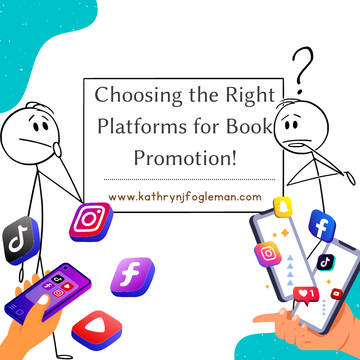 In the magical kingdom of book promotion, social media serves as the enchanted gateway to connect authors with their readers. However, with a plethora of platforms to choose from, it's crucial to identify the right ones that align with your book and your audience. So, grab your quill, fellow wordsmiths, as we embark on a journey to discover which social media realms are worth exploring for effective book promotion.
In the vast realm of social media, each platform offers a unique portal to connect with readers and showcase the magic of your literary creation. The key lies in choosing platforms that align with your book's personality and where your target readers dwell. So, fellow wordsmiths, cast your promotional spells wisely, and watch as your book takes flight on the wings of social media magic! Recommended booksBelow are two amazing books I recommend you read to improve your marketing skills! Here's the part where I tell you that these are AMAZON AFFILIATE LINKS. So, when you click one of these links below and purchase something, not only do you support the person who created it, but I get a small commission that helps me pay the bills!
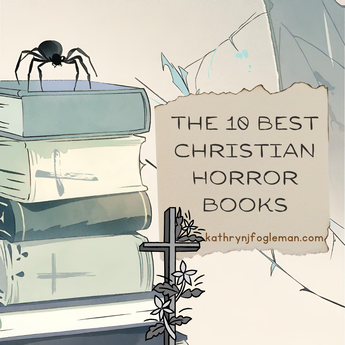
Ah, the season of pumpkins, ghosts, and candy-induced sugar highs is upon us! I personally get very excited for any excuse to dress up in a costume. This year, my family and I will be dressing up as Scooby Doo characters. I was looking for comfortable clothes at the thrift store and stumbled across some outdated styles that would work perfect for Shaggy and Velma, and I totally lost control. I had to do it. Comfortable cosplay? Yes please!
Anyway, I also get super excited for Halloween because that's the time of year I get hundreds of people coming to my door, asking for a treat. As a Christian (and an extrovert), I love handing out candy and fun Bible tracts that give kids and grown-ups alike hope for the future, reminding them that they aren't alone, they have a purpose for existing, and they are so very precious. What better time to remind them that they can have a beautiful life, even after death, when they are literally surrounded by images of death and the afterlife? Halloween can also be a great time to explore the spookier side of Christian theology and literature, and there are some hauntingly good books out there that I have enjoyed (even as I hid under my blanket from the monsters). So, grab your flashlight, prepare your best "I'm not scared" face, and let's delve into ten spooky Christian books that are sure to add a holy chill to your Halloween. I've also included songs with each book to enhance the eerie ambiance (ooOOooOOooH!): this is the part where I tell you that there are Amazon Affiliate links in this blog post. So, when you click one of these links and purchase something, not only are you paying the author for their hard work, but you are helping me buy dog food and animal crackers!
Bonus!
I feel like This Present Darkness by Frank Peretti deserves an honorable mention, and I must also add an indie author to this list, and that would be Zach Carpenter's Reclaimed Saga.
And there you have it! These spooky Christian books are perfect for a Halloween that combines the sacred and the spine-chilling. Remember, the best way to ward off monsters is to read with all the lights on and a healthy dose of humor... and by watching a princess movie afterward. Enjoy your faith-filled scares, and let me know in a comment if there are any others you would add to this list!
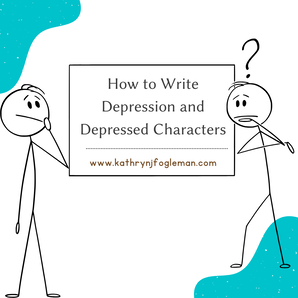
Depression is generally invisible. It also doesn’t just happen overnight, most of the time. It usually takes years of build up. Outwardly, someone may be functioning very well, but inwardly, they are getting more and more tired and weighed down and hopeless. They usually don’t understand why, and they usually don’t think “I must be depressed”, and they very rarely go get help. In fact, they may even be thinking “I just don’t sleep like I used to. I just don’t have energy anymore. It must be all this stress, or my kids keeping me up, or I’m just getting older and things are changing. I just need to get my crap together and do better.” so they eat better, go to the gym, adjust their sleep schedule, or try to power through it all as they maintain the same patterns and habits.
So, if you’re an author trying to write a character who is depressed for reasons other than a crazy dragon burning down their village and killing all their family, how do you write what’s invisible? Don’t immediately jump to making your character want to commit suicide! While suicidal thoughts are a sign of depression, it’s not the only sign.
There are nine signs of depression, and for a doctor to diagnose you or me with depression, there must be 5 of those 9 signs that need to have been present for at least a couple of weeks. I use these to write depression in one of my characters.
Now, like I said, don’t be a slacker and immediately make your character want to take a quick trip off a bridge, AND don’t make your character have all the symptoms. Depression is a complex thing happening to a unique person, taking weeks or years to break them down, and it should be respected as such, even in our writing and storytelling.
When writing a depressed character, take a step back and look at the events that have made them depressed over a period of time.
Remember, depression takes time to build up, and it takes time to break down. It wasn’t created overnight, and it won’t be cured overnight either. So, don’t throw a “cure” at your character and immediately make them better by the end of the story. They should absolutely be on the road to getting better by the end of the story, but there is no quick cure to depression. Even if all of their problems were to fade away and all their dead loved ones were to resurrect and be in perfect health, they would still have to work to heal their brain from the damage that depression has caused. Even the Bible says at the end of all things when God creates the new heaven and new earth He will still have to wipe some tears away (Revelation 21:4). Yes, there won’t always be crying or mourning or pain. Those will go away. They won’t last… just like depression doesn’t last forever, especially once we get help.
September is Suicide Awareness Month. September 10th is Suicide Prevention Day. If you would like to quietly bring awareness to this growing issue in our society, and lovingly remind people that there is a better way to overcome their struggles and mental health without judgment, then there are tons of ways to share hope. I will link a few items below using my Amazon Affiliate Link. So, if you click on the images and purchase any of the items below, you will be helping the artists/authors who created it AND help me pay a few bills at the same time. ☻ There are also some great books that I highly recommend reading to learn more about depression, how it affects the brain, and how to start healing from it - whether you think you are depressed or not, I recommend reading (or listening!) to these books. They are also Amazon Affiliate links. If you are someone who struggles with depression, know that you are not alone. You are loved. You matter. You are precious. There is hope. There is help. You were never made to do this alone. Please talk to someone who will listen and help. ♥ Suicide Awareness & PreventionBooks I Recommend You Read or Listen To!
This is a bit random, but I love to travel. Any time I get out of the house and go somewhere new, my imagination is set on fire. I am always in awe of the new places I see. However, every time I travel, I always end up meeting someone who says they hate it and that they think everyone should stay home. Look, I get being a homebody. I definitely need my home time and down time after travel. There are times when I just need to stay home and rest, and I make sure I get those times. Most of my siblings are homebodies and introverts. I understand their need to recharge and not travel as much as I do. BUT... *here begins the soap box speech* I think travel is essential for humanity, and especially for children as they move into their teen years. I think God made us for travel and made it essential for our thoughts and our brains. He constantly told people over and over again in the Bible to leave, move, get out, go, etc. (Ezekiel 12:3, Matthew 10:23, Genesis 12:1, Exodus 40:36) Travel makes us appreciate and praise Him more by witnessing the vastness of His creation. It allows us to spread His light and love to others. I love how Mark Twain put it: "Travel is fatal to prejudice, bigotry, and narrow-mindedness, and many of our people need it sorely on these accounts. Broad, wholesome, charitable views of men and things cannot be acquired by vegetating in one little corner of the earth all one's lifetime." I get it. Lots of travel, long road trips, and/or globe trotting is not for everyone. But, we grow when we travel, and I think a lot of issues in our country today are due to people not facilitating that growth in a healthy way. Too many people travel to run away from their problems, others travel only to work and chase the all-mighty dollar, and others still never travel at all due to various fears or legitimate problems (lack of money, health, social anxiety, etc.) A healthy amount of travel for a healthy individual is good - even essential - for the mind, body, and soul. *here ends the soap box speech* What are your thoughts? Let me know!  My husband, Steven, and I have a travel vlog! If you enjoy traveling, or like to watch other people travel and talk about cool places to visit, then our YouTube channel is for you! As Okie Dokie Explorers, we are advocating for the exploration of Oklahoma while actively enjoy God's beautiful creation in our state by exploring in it (and sometimes beyond it). We show you everyday adventures in rural, small town America, along with product reviews and travel videos. New video every Wednesday! (Usually... most of the time...) Do you need help staying consistent with your social media? I can help you! Enjoy talking about books, movies, and music? So do we! Listen in every week!
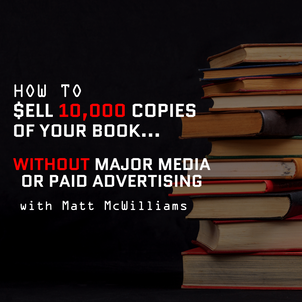 Are you ready to skyrocket your book sales without spending a fortune on advertising? Do you feel like selling your book is an uphill battle? Well, I have an exclusive webinar coming up that you won't want to miss! Introducing "How To Sell 10,000 Copies of Your Book...Without Major Media or Paid Advertising." This webinar, hosted by my friend, Matt McWilliams, will reveal the secret behind selling thousands of books and making money off your launch. Unlike other webinars that offer mere tidbits of information, this webinar will provide you with in-depth, actionable strategies that you can immediately implement to achieve your goals. We'll guide you step by step through the process of attracting affiliates and multiplying your sales force exponentially. Whether you're a beginner or a seasoned author, this webinar has something for everyone. If you're just starting out, we'll cover the basics to ensure you have a strong foundation. For experienced authors, we'll share the advanced techniques that Matt and I have used for years to achieve remarkable results. Time is of the essence, so don't delay! Register now by clicking the link below and secure your spot for "How To Sell 10,000 Copies of Your Book…Without Major Media or Paid Advertising." https://mattmcwilliams.clickfunnels.com/how-to-sell-10-000-copies-of-your-book-without-major-media-or-paid-advertisingk92s3ltd?affiliate_id=4094092 Don't let this opportunity pass you by. Join us for this eye-opening webinar and learn the strategies that can transform your book sales. We look forward to seeing you there! 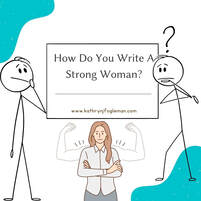
In books and movies lately, we’ve mostly seen one type of strong female character — the ass-kicking kind. This has led to a slew of characters who are often one dimensional and less interesting than their side-characters (Legend of Korra, I am looking at YOU). Black Widow and Wonder Woman are cool, but women can and are strong in other ways. They don't all have to be martial artists. Some can sit at their computer late at night and write blog posts...
Many agents and publishers will claim they are searching for "strong female characters". However, I encourage authors to avoid using that term, especially in queries, as it has become kinda toxic. I mean, people never need to include the word “strong” to describe a male character, so why should we include it for a woman? Instead, SHOW us how strong your heroine is without actually using that word. (Here's the part where I tell you that some of the following links are Amazon Affiliate links. If you purchase something through my link, I get a small commission which helps me pay the bills) We didn't need to be told thatJane Eyre was strong. We watched her go through trauma after trauma and come out of it again, always determined to be a better person. We didn't need to be told that Scarlett O'Hara was a strong woman. We watched her single-handedly pull her plantation from the brink of destruction. We didn't need to be told that Princess Leia was strong. We saw that in her dialogue, leadership, actions, and choices, all which ultimately led to the rebels beating the empire. What are the traits of a strong woman? She has a big goal. Big, memorable characters have big, memorable goals. It's the author's job to place stumbling blocks and hazards at every turn that make it almost impossible for the characters to achieve their goals. The bigger the goal and the harder it becomes to achieve, the stronger your female character will have to become to achieve it. Learn more about how to write deep character goals here. She has an enemy. This doesn't mean your character has to face a super archnemesis. It can be their own vices, such as addiction, self-sabatoge, mommy/daddy issues, etc. Whatever their adversary is, the meaner and more powerful it is, the better. Your protagonist’s strengths become clearer in the face of conflict and contrast where their ideals are put to the test and their reason for wanting to achieve their goal is truly brought into question. She is flawed. Strong women are not perfect (Remember: disabilities don't count as flaws!) One of the most common problems I see is that the strong female character NEVER messes up. Even when she does mess up, it is always portrayed as an innocent mistake that she can correct and is forgotten, or it was really someone else's fault and she was being the better person and taking the blame. Or, worse yet, her mistake is actually the thing that ends up saving everyone. That is weak storytelling. Strong women in real life make terrible mistakes that have consequence and that haunt them at night for years to come. They screw up and they have big emotions that get out of control - they are not perfect. Thank God! I would feel terrible if every strong woman had her act together and never made any mistakes. She learns. Every strong woman learns from her mistakes and changes so she does not repeat it. That's part of what makes her strong. Some have to repeat the mistake a couple of times more than others, but she ALWAYS learns from it. Don’t skimp on her emotional development. What does she learn? How does she change? How is she a different person now compared to the beginning of the story? She is realistically beautiful. There are lots of different ways to be beautiful. Let your strong female character stand out by giving her physical attributes that mirror the real world. Remember that many women throughout history don't fit our modern definition of "beautiful" and yet have been called beautiful and strong because of their actions and choices (look at many female saints in the Catholic church, for example). She can be a beautiful soul without having a beautiful face, body, or hair. Remember, it's all been done before. To write a character who is more than a walking cliché in heels, it’s important to approach her as someone you are committed to getting to know. Use a list like this to help you write a well-rounded character. If some of her traits feel similar to someone else, that's okay. Remember, we enjoy the familiar. Making her predictable and flawless is the part you should avoid. Let your character surprise you! The best characters sometimes have traits that seem unlikely but are spot on. For example, your character might be an upstanding officer of the law, but is married to a former convict who made her feel special, and she now is secretly plotting to steal someone else's baby after she learns she's barren (have you watched Raising Arizona?). Take time to discover your character’s secrets, don't be scared to let her be imperfect, and you’re more likely to create a well-rounded character. Listen to my podcast episode about strong women!Recommended Books
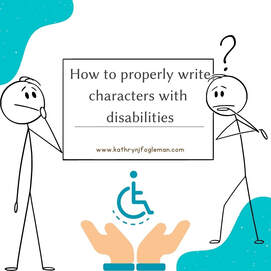
As someone who grew up with family members who had disabilities (dwarfism, blindness, amputation, etc.), and as someone who personally has severe hearing loss and is legally deaf, I often cringe at how people with disabilities are portrayed in books and movies. More often than not, we get no representation, much less proper representation. The kid who rolls onto the scene in a wheelchair with a chip on their shoulder is just... overdone. They are a flat character who gets used for "inspiring" and "tear-jerking" fodder. And they don't represent but a very small minority of those with disabilities.
So, I'm going to give you 6 tips for how to properly represent people with disabilities in your writing and stories. 1. Remember We Are Human As with writing any character, we are a complex human being first. We have strengths, flaws, desires, and struggles just like everyone else. A disability is not our only struggle. We have family dynamics, dreams, hopes, crappy days, good friends, and every other thing that human beings experience, along with the added struggle of a disability and the trials that come with it. Disabled people have lives just like everyone else. Make their struggle complex and realistic, and not focused solely on the disability. Make the story about THEM, not their disability. They are not broken or abnormal, just different, the same way cat and dog people are different and have different struggles. 2. We are not our disability Just because you have long toes or short toes, you don't identify as a long or short toed person. In the same way, we have a disability but our identity is not that disability. That being said, here comes the tricky part: disabilities can affect every part of life, even down to simple acts, but those with a disability don’t even realize all the ways their disability affects them. More often than not, it is just our normal way of life. My great aunt with dwarfism could not reach the sink faucet without a stool, or sit on a normal toilet without steps. However, that did not define her. She was her own person with daily habits that were different from ours. 3. Do Your Research If you want to accurately portray someone with a disability, you have to find out what living with that disability looks like. This means reading and watching things by people who actually have the disability and asking them if it’s okay to interview them. If they agree to be interviewed, listen to their response. They are the expert. Also, not all disabilities involve traumatic experiences that leave someone in a wheelchair or missing an arm or leg, or leaving you deaf, as is my case. The Census Bureau found that 96% of people have an invisible disability. This means you can’t tell a person is disabled just by looking at them. Most don't use a wheelchair! People with invisible disabilities tend to get left out of novels, because they are harder to write, but they are literally the more common in the disabled world. 4. Stop "Curing" Us! It sure would be nice if a fairy godmother could bippity-boppity-boop us into being "normal". But in real life, disabilities are not something that can be overcome. Disabilities aren't something that can usually be cured, or disappear, and people with disabilities don't achieve success "in spite of" their disability. Our disability is something we live with every day, like curly hair (my curly hair people know exactly what I'm talking about, lol). While it can be difficult and frustrating at times, we dust ourselves off and do what needs done to live our life. Also - heads up - there can be good things that come out of disabilities! Either way, the easiest way to avoid "curing" a disabled character is to not make the entire story about the disability. Make it about them, the person. 5. Make The Disability Clear As You Weave It In Many writers want to add a disabled character for some diversity in their story, and that is great! However, many don't specify the disability because they are afraid of getting it wrong. So... the character might as well not be disabled at all. To avoid making your character say it out loud or wear a T-shirt that labels them, illustrate their disability through thoughts, accommodations, and dialogue. Remember, disabilities are not a character flaw. Accommodations can look like a character who sits down every time they have the chance, tilting their head to hear, using devices to open jars, or even special lighting in their room. Again, do your research, ask questions, and practice weaving it into the story you are telling. It's not our identity, but it is a part of our everyday life, so it should be a part of your character's everyday life too. 6. PLEASE Add Humor I’ve never known or met a person with disabilities who didn’t joke about it. We use it as a coping mechanism (some days you've either gotta laugh or you're gonna cry), as an ice breaker, and sometimes we use humor because - come on! - it's funny! Some of us make light-hearted quips about it, and some of us have a darker sense of humor. Whatever kind you are into, humor is a great way to break up your story. If you Google “X disability humor” you’re likely to find a few good jokes. Sift through them and find tasteful ones your character can use. And, as always, don't be afraid to ask the experts (those with the disability) if that joke would be funny or something they would use. Listen to my podcast episode about this topic!Recommended Books
There are lots of great books out there about people with disabilities. Most of them are written for kids, as it's very hard to find any adult books with disabled characters. I'm going to recommend a few that I know are great using some Amazon Affiliate Links. If you purchase one of these books using the links below, you will be supporting me AND the author!
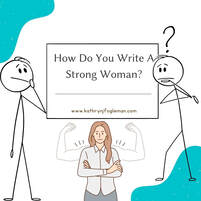
The difference between a synopsis and a blurb is that the synopsis is a brief summary of the major points of a story, while the blurb is a short description of a book and used for promotional purposes.
So, how do you write a synopsis? It's no secret that authors can write hundreds of pages of enthralling story, but can't summarize the story to save their life! Here are 5 tips to help you on your way... BTW, I have listed some affiliate links to helpful books I recommend. If you purchase one of the books, you help me AND the author pay the bills. So, thank you in advance! 1. Keep it to a long brief. The purpose of a synopsis is to give an agent/editor/reviewer a full overlook on how your story starts, carries through, and ends. Yes, that means you give away the ending and plot twists. They want to know exactly where your story is going, and how you’re going to pull it off. With that in mind, it should obviously be longer than the blurb, but no longer than 5 pages. Even if you have a 3 book series you are pitching, your synopsis should be kept between 3-5 pages. 2. Keep your characters interesting. If you're using words like “warrior,” “dragon rider,” or “moody high schooler,” then we need to have a talk... These nouns are fine so long as they are paired with interesting identifiers, such as “knife-obsessed,” “dragon egg thief,” or “reluctant rock collector.” Describing my character as "Keegan is a cynical warrior, orphaned at a young age and adopted by a dragon" doesn't make nearly the impression as "Keegan is the daydreaming Dragon's Son who is terrified of dragons and has eye-rolling disbelief in sincerity or integrity from his fellow man". (Did I just struggle for a solid hour to write that? Yes I did. Do I like it at all? No. No I don't.) Don’t let your character be defined only by their mood, title, enemy, and quest. What makes your character—human or otherwise—unique? How can you work their quirks into a single sentence that explains them? 3. Keep it snappy! Agents don’t need to know that “Keegan woke up from a dream, ate breakfast, woke the boys, got fishing tackle together, and went to the river only to run into a monster” Rather, they’ll need to know that your character “went to the river with the kids for the day, where they were ambushed by a monster”. Yes, you are supposed to explain your entire plot, but don't bore us with endless details. Just the important stuff! Use active voice, keep it interesting, and reveal only the major beats (and read THIS BOOK if you don't know what a beat is). Those reading the synopsis should never be bored; rather, they should be excited. 4. Keep it easy to understand. This is SO important if your story is SciFi or Fantasy. SFF plots can be twisty-turny, character lists can be long, and magic can be overwhelming to explain. Do your best to make it clear, as if you are telling a child the quick version of your story without loosing their interest. Keep it clear. Keep it concise. Remember that your readers aren't dumb, but they don't know your story like you do. They want to be excited about your story, not confused. They want a good reason to read the entire book. 5. Keep it flowing. A synopsis should be an easy, fun read. Does each paragraph make you automatically flow to the next? Does it provide a memorable fact about your characters or plot? Ask yourself these questions to avoid telling versus showing. Keep your synopsis concise, but entertaining. You are a story teller! Tell us the quick story. Apply the same writing style you use in your manuscript. If it helps, write the synopsis like a letter to a friend. I once wrote a synopsis to one of my characters in the story, explaining it in such a way that they would be excited to get to the end, instead of stabbing me to death! However you do it, I recommend you read it out loud to yourself... like, a lot. Make sure it flows smoothly, makes the characters sound fun, explains the plot points clearly, and is exciting.
|
The beasts of the field shall honour me, the dragons and the owls. - Isaiah 43:20
The AuthorKathryn WhiteSelf-published author of the fantasy series, Tales of the Wovlen, Kathryn spends a great deal of time in the world of her imagination, having tea with fire breathing dragons, writing books on flying space ships, and practicing her mad scientist laugh with gusto. However, on occasion, she returns to this world just to play with her dog, blog about her fun, and coach people through writing self-doubt. My First BookMy Latest BookConsider buying my books, or other books, using my affiliate links:
Never Miss a Post! Sign up for my Newsletter here!Archives
January 2024
Categories
All
|













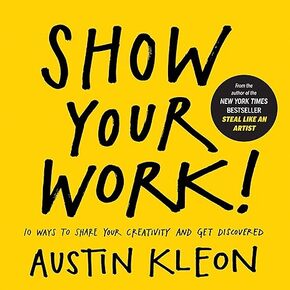
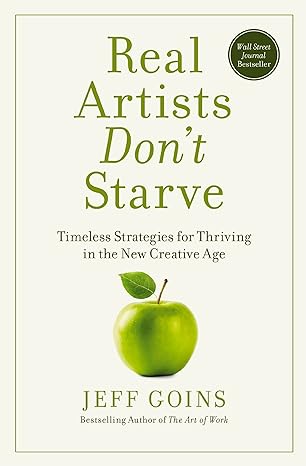





























 RSS Feed
RSS Feed
